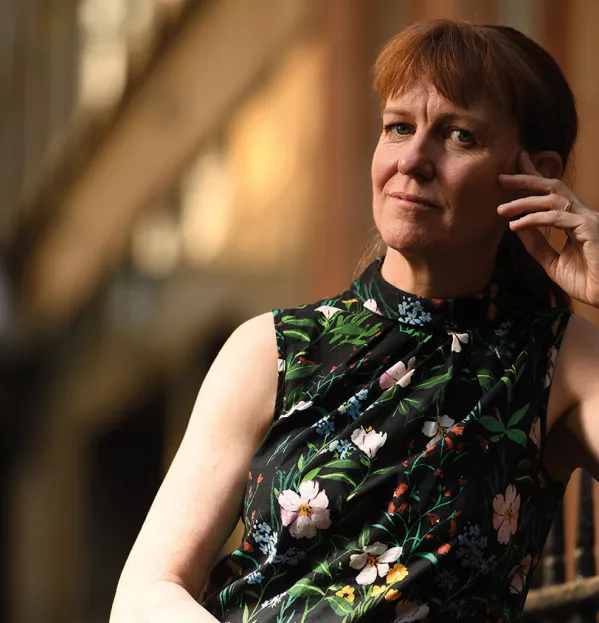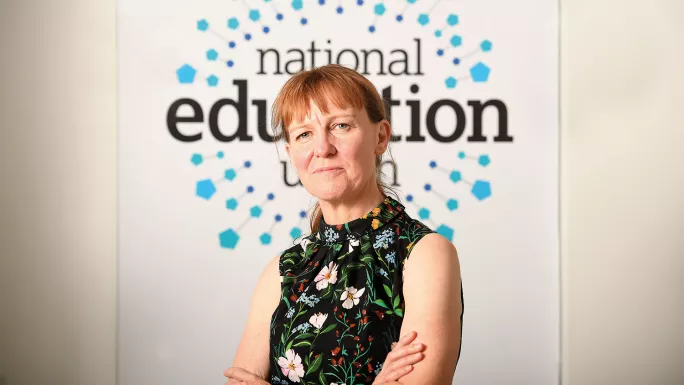‘Government policy has sucked the heart out of teaching’

Seven pairs of elegant shoes are neatly lined up against one wall of Nansi Ellis’ bright and spacious central London office. It’s all part of the smart and professional appearance she wants to portray as assistant general secretary of the NEU teaching union.
“I wouldn’t have worn heels like this in the classroom,” laughs the former primary school teacher.
Ellis quit the classroom for policy shortly after completing an MA in the early 1990s and has never looked back. She made the switch, she says, because she realised that what she enjoyed most “was the thinking about the stuff rather than the doing of the stuff”. As the woman in charge of the new superunion’s entire education policy and research output, she now has plenty of thinking to do.
Some illustrious figures have held the previous incarnation of her post at the NUT. Most notable is Sir Michael Barber, who, after heading up education policy for the union, ended up advising the Labour government on schools policy in its first term, and led the prime minister’s delivery unit in its second.

But Sir Michael’s time at the union was in an era when local education authorities had more clout, the government interfered less and unions arguably had a stronger voice. His modern counterpart is operating in a very different climate. But, as Ellis points out, she is part of a bigger outfit.
It’s nine months since the NUT and the ATL came together to form the country’s largest education union, with a combined membership of more than 450,000. In terms of union strength, size matters. Ellis says the presence of members in so many classrooms up and down the country represents a “groundswell of activity” that it can bring together to get the government “to listen” to informed views.
It is, she says, a “massive” opportunity to redress the balance that has, over the years, tilted towards the government taking a “bigger and bigger role” in policy and increasingly seeing teachers and professionals merely as the agents of delivery.
“I’ve said for a long time, I would like to be part of an organisation where the government can’t move without talking to us first,” says Ellis, who comes from the smaller ATL side.
“And I don’t mean me. I mean us as representatives of the professional in the classroom, and not just the kind of select few in academies that the government goes to, but a wide resource of professionals who will have different views.”
She adds: “I’m not saying we should say no to everything. I’m not saying the profession as a whole has the right answers to everything, because it should be a partnership, and what I hope, with the growth of the NEU, is that the partnership becomes a more equal one where the government and the profession, via the unions, work together, rather than it being big government telling little teachers what to do.”
Ellis’ in-tray brims with issues affecting teachers’ professional lives. On top of that, she is getting to grips with the changes and challenges that come from the process of union amalgamation, midway through transition. There is, she confirms, “a lot going on”.
Ellis laughs when you ask her just how stressful it all is, but she is candid in her reply: “It depends on when you ask me really.”
A glance at Ellis’ background suggests she knows a thing or two about marshalling the best from different cultures. She is the bilingual middle child of a Welsh university lecturer and an English former infant school teacher, who were both Methodist lay preachers. Ellis did her school studies in Welsh and moved from Dinas Powys, on the outskirts of Cardiff, to the Welsh valleys in 1984 after her father quit his job to do lay work in the church to support striking miners and their families.
Coming from a comfortable middle-class background, she saw close-up “that level of complete helplessness that was going on” for the beleaguered mining families living without an income and struggling for food.
Change of scenery
Ellis underwent another complete change of scene when she went to the University of Cambridge for four years to train as a primary teacher, specialising in religious education - a role she went on to work in for just three years. She then worked as a supply teacher while doing her master’s and for a year after, then quit the classroom altogether.
Ellis says that, had there been some opportunity for engagement with research to reflect on her practice as a teacher, she would have stayed longer in the classroom. She is a proponent of the idea of a CPD lead in every school who could coordinate teachers’ professional development through reflective practice and engagement with contemporary research.
“You don’t need every teacher to be engaged in research constantly, but you need somebody in schools who is doing that, who is helping to translate that [research] and who is focused on the evidence and how it pans out in the classroom,” she says.
A couple of days after our interview, education secretary Damian Hinds announced a pilot scheme that will offer teachers up to a year’s paid sabbatical after 10 years of service to pursue projects that will benefit their teaching. When we speak again, Ellis welcomes the announcement as a “step in the right direction” but says that a standalone sabbatical after a decade in the job would never have kept someone like her in the classroom. The sabbatical needs to be part of a longer-term career development strategy that allows staff to reflect for short periods of time on a regular basis, says Ellis.
“Government policy has sucked the heart out of teaching really, by making it about data and delivery and so an opportunity to step back and reflect on a relatively regular basis is what we need for teachers to actually be able to do the job and remind themselves what’s important and what is at heart of the job they do,” she argues.
Her speech is fluent and fast-flowing. But you can detect a slight constriction in Ellis’ voice when she discusses the myriad issues that need thrashing out across the fledgling new union. And she doesn’t duck the issue when pressed on the rumours of murmurs within the ATL camp that it sometimes feels more like a takeover by the much larger NUT than amalgamation.
“It’s a difficult one, I think,” says Ellis delicately. “Because we are the smaller partner, we are having to work very hard to make sure that the culture that we have and the things that we do and the ways that we do things are still in the conversation with the NUT colleagues.
“What we need is something that is different from both ATL and NUT. And I think, in order to do that, we as the ATL, the smaller partner, feel we are having to hold on to stuff and push it through - not so that’s what you get in the end, but so that’s part of the conversation and we can grow something better. So I think that’s what it is: it is trying to grow something better; the best of both.”
While the UK-wide ATL was an education union widely seen as moderate, the NUT was the largest teaching union for England and Wales that many cast as the most militant in the pack. What challenges does the coming together of these two cultures present for Ellis, who worked at the ATL for 17 years?
She says the challenges spring not just from the “very different” ways that staff are used to operating across the two different organisations, but their activist base, too. As an example, she contrasts the national executives of the NUT and ATL sections. Of the NUT, Ellis says: “It’s much more political than ATL’s executive and so that is something that, obviously, NUT staff are used to working with and we are not. That has an impact on the way staff will work. But also the NUT has a history of very strong local activism, which the ATL doesn’t have so much.”
What is needed is working out how to use this “in a way that doesn’t alienate some of our members”. She cites the growth of fair workload charter schemes in parts of the country, designed to help schools manage excessive teacher workloads, as an example of the sort of local activism that the NEU should harness. “NUT activists started a lot of that work, pulling in other unions and really getting that to be a support for professionals in workplaces,” says Ellis. “That’s the ultimate aim, isn’t it? That we are supporting professionals by working with them locally but also by arguing with government and telling the government what they need to be doing.”
Ellis’s brief as education policy lead means she is not short of things to work on. The motions recently passed at the last of the NUT and ATL conferences are being considered by the NEU’s joint executive council and most that go forward will land on her desk.
Among these motions was one advocating non-cooperation with the new baseline assessment tests by the NUT, and one opposing Year 4 times-tables tests by the ATL. Both sections have long opposed the current system of high-stakes statutory assessment - a view expressed by Ellis. But not many within the NEU are in a position to admit, as she can, to having worked on statutory assessment - in the first year of a four-year stint at the School Curriculum and Assessment Authority, which would later be folded into the Qualifications and Curriculum Authority.
She worked on the management of key stage 2, then moved to the early years team, where, just before she left to move to the ATL in 2000, she was involved in the accreditation and evaluation of baseline assessments drawn up by local authorities in her role as a civil servant. They were a “complete nonsense then”, as they are now, she says.
The NEU will be watching closely the baseline assessment pilots and conducting its own evaluation, says Ellis. “We’ve said all along if you can show us this is a test that will actually help children as they start school, will help teachers to know what it is that children can do and what support they need, and it can be done in a high-stakes accountability environment without distortion, then we will support it. But we don’t believe that the DfE can actually demonstrate that, because they’ve given us no evidence that anybody else does it, or that the way in which they want to do it is going to work. So we will engage in the evaluation because genuinely if that shows that it could work, then we will work with it.”
And baseline is only one issue. Her team is also looking at funding, workload, and pay.
With so much terrain to cover, that shoe collection is going to come in handy.
You need a Tes subscription to read this article
Subscribe now to read this article and get other subscriber-only content:
- Unlimited access to all Tes magazine content
- Exclusive subscriber-only stories
- Award-winning email newsletters
Already a subscriber? Log in
You need a subscription to read this article
Subscribe now to read this article and get other subscriber-only content, including:
- Unlimited access to all Tes magazine content
- Exclusive subscriber-only stories
- Award-winning email newsletters